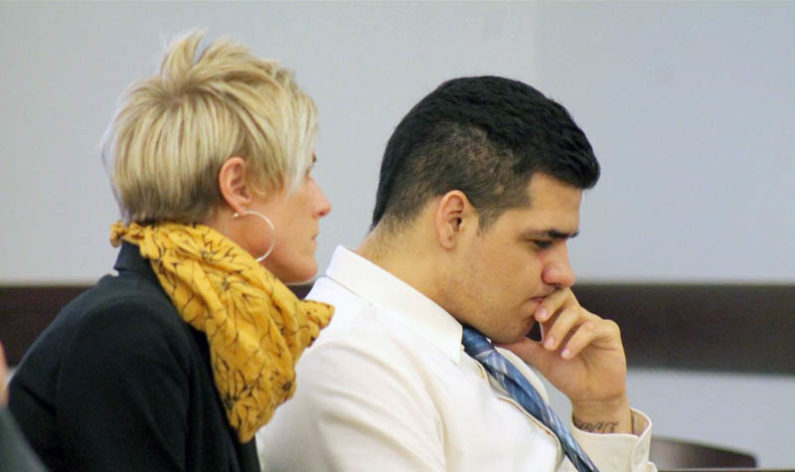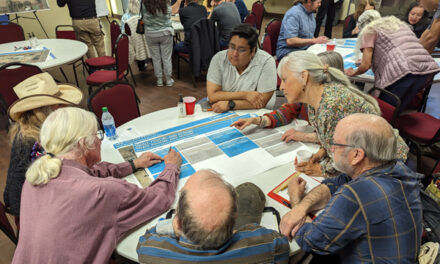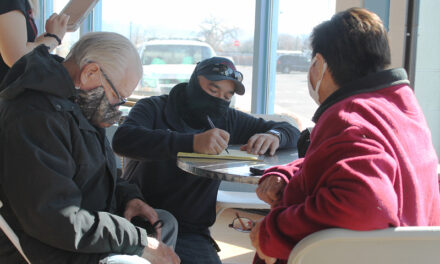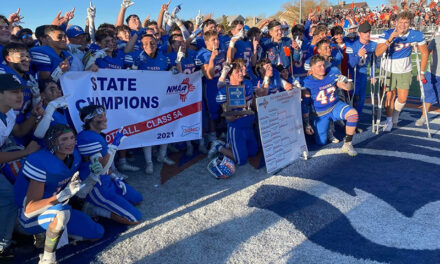
Brandon Villalobos listens as a judge declares a mistrial the murder case against him Tuesday afternoon. Because Villalobos has an IQ of 64, which by state statute defines him as intellectually disabled, Megan Leschak, who is trained to communicate with him, sat with Villalobos during the brief trial. Julia M. Dendinger | News-Bulletin photo
After a witness for the state fumbled a question on the stand in a murder trial nearly six years in the making 13th Judicial District Court Judge James Lawrence Sanchez declared a mistrial.
Brandon Villalobos, 20, who is accused of killing his 12-year-old-friend, Alex Madrid, on Feb. 17, 2014, will get a new trial in February.
Villalobos, who was 15 at the time of the allege homicide, has been indicted by a grand jury on an open count of first-degree murder and one count of tampering with evidence.
“I am compelled to declare a mistrial,” Sanchez told jury members Tuesday before he let them leave. “This was not a decision I made easily.”
Sanchez rescheduled the trial to begin again on Monday, Feb. 3.
Mark Earnest, representing Villalobos, called for the mistrial after former Valencia County Sheriff’s detective Alejandro Lara took the stand and referenced an interview he’d conducted with the defendant in 2014.
Lara was one of two VCSO detectives who questioned Villalobos in regards to Madrid’s death. During the interview, Villalobos told the detectives he and Madrid were jumped and assaulted by three unknown men.
About an hour into the interview, he was handcuffed, and while Lara was standing outside the door to the room, Villalobos allegedly admitted to hitting Madrid once with a crowbar.
In May 2018, the judge ruled statements made by Villalobos to detectives after Miranda warnings were given and he was handcuffed would be suppressed — meaning they couldn’t be used at the trial.
He also ruled that statements by Villalobos before the Miranda warning were admissible, since he was not detained as part of a criminal investigation at that time. The state appealed Sanchez’s ruling, but the New Mexico Supreme Court affirmed it on June 24.
During hearings preceding the trial, which started on Monday before abruptly ending Tuesday, Sanchez reminded both the prosecution and defense that reference to the interview and statements made after Villalobos was handcuffed would not be admissible during the trial.
After Lara’s reference to the interview, Earnest argued even if no details had been disclosed, members of the jury would ask the logical question of what was disclosed during the interview.
“He was interviewed, arrested and six years later, is sitting here in front of a jury,” Earnest said. “The jury is going to think something said during that interview led to (this).”
Assistant District Attorney Jessica Martinez said the defense practiced with Lara as recently as last week to make sure his testimony didn’t violate Sanchez’s order.
The judge said he didn’t believe there was any intent or malice on the part of the prosecution.
“But I think it was a big oops, a particularly prejudicial oops,” Sanchez said. “If I was sitting there, I’d want to know what did he say?”
He asked Martinez what kind of instructions he could give to the jury to “overcome any unfairness” caused by Lara’s testimony.
“You could say it was a bad question, that the officer misunderstood and to disregard the answer,” she suggested.
Sanchez didn’t like that response, saying it would look like he was making up something.
Earnest told the judge if the mistrial was granted, he would move to have the case dismissed with prejudice, as well as request Villalobos be released.
“This kid has been sitting in jail for five years and 10 months. If you grant a mistrial, I am going to ask that you release him, even if there’s a new trial in February,” the attorney said.
Sanchez warned both sides a new trial was not an opportunity to make changes.
“I am not rewarding the behavior here today; this is not another shot,” he said. “This has been a parade of horribles; things going wrong over and over. We have to find a way to try this. There has to be a trial. At this point, there is no more room for delay or error. So get ready.”
One entry in the “parade” Sanchez referred to came at 7:30 a.m. Monday, less than two hours before jury selection was set to start.
Last week, on Thursday, Dec. 12, Earnest filed a motion to dismiss for prosecutorial misconduct. According to the motion, and a supplement filed on Friday, Dec. 13, Earnest contacted New Mexico Department of Public Safety forensic DNA scientist Samantha Rynas to determine if the state had subpoenaed her for the trial.
He found there were two DNA tests done by NMDPS, which had not been turned over to him by the prosecution during discovery.
One was from September 2018, which indicated there was no blood on the clothes Villalobos was wearing at the time of his arrest. The second report was from May of this year for testing done on the victim’s pants, which found a DNA mixture of three individuals, one of which was Madrid’s.
“Blood from those pants was compared to Brandon’s DNA standard and Brandon was eliminated as a source of this DNA profile,” the motion reads.
During the motion hearing, Earnest told the judge the report contained much more information than that.
“The report shows there is DNA of at least three individuals, none of which are Brandon Villalobos,” Earnest said. “There are two unknown DNA samples on those jeans and that is infinitely exculpatory.”
Exculpatory evidence is evidence that tends to excuse, justify or absolve the alleged fault or guilt of a defendant.
Sanchez asked the prosecuting attorneys if they had received the reports.
Barbara Romo, the chief deputy district attorney, said they did not. She said the state crime lab sends reports to the investigating law enforcement agency, and that information is then forwarded to the district attorney’s office.
In the case of the DNA testing done in 2018, it appears someone with the DAs office made the request for testing directly to the state crime lab. According to copies of emails Earnest filed with his motions, assistant district attorney Alisha Maestas was included in the conversation between the state lab and the Valencia County Sheriff’s Office evidence technician at the time, Debra (Dee) Hall.
The emails indicate Rynas sent the report to Hall on Oct. 4, 2018.
Sanchez did not dismiss the case at that point, saying he didn’t see misconduct so much as confusion and lack of communication. The judge told Earnest he could bring in the two additional DNA reports as evidence in the case.
Julia M. Dendinger began working at the VCNB in 2006. She covers Valencia County government, Belen Consolidated Schools and the village of Bosque Farms. She is a member of the Society of Professional Journalists Rio Grande chapter’s board of directors.
















